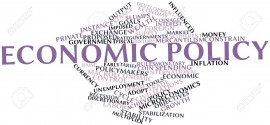- Fecha(s): 22/01/2016
- Lugar: Seminario del Departamento de Métodos Cuantitativos para la Economía y Empresa, UMU. Retransmisión en directo pendiente confirmar.
- Ponente: Rafael Valero. Universidad de Alicante

Abstract The aim of this paper is to create counterfactual series in a reliable way and illustrate its use. The present literature is dominated by the Synthetic Control Method (SCM), but there are cases where it cannot perform and it was not created considering the trade-off between bias and variance, hence the accuracy of results…
- Fecha(s): 06/11/2015
- Lugar: Seminario del Departamento de Economía Aplicada, UMU. Se retransmitirá en directo.
- Ponente: Carmen Díaz-Roldán

Abstract I Parte: Presentación teórica. Modelos macroeconómicos para una unión monetaria En esta sección se va a presentar un marco general para el análisis macroeconómico. Para ello se desarrollará un modelo de carácter autocontenido, que tras describir una economía cerrada por el lado de la oferta y la demanda, se ampliará para poder representar una…
- Fecha(s): 30/10/2015
- Lugar: Seminario del Departamento de Métodos Cuantitativos para la Economía y Empresa, UMU. Se retransmitirá en directo.
- Ponente: María Isabel González-Martínez, Universidad de Murcia

Abstract Following the ideas of the Tourism Area Life Cycle (TALC) theory, we propose a dynamic econometric model for tourism demand where the reputation effect (the effect of the lagged demand on the current tourism demand) is not constant, but dependent on congestion. We test the model using panel data from Spanish regions during the…
- Fecha(s): 03/07/2015
- Lugar: Seminario Martínez Gallur, Facultad de Economía y Empresa. Se retransmitirá en directo.
- Ponente: Timothy J. Kehoe, University of Minnesota y Federal Reserve Bank of Minneapolis, USA. Pau Pujolas, McMaster University, Canada.

Abstract Recent research in international trade simultaneously has developed along two branches. Empirical research measures plants’ productivity and shows that exporters are more productive than non-exporters. Theoretical research develops models of heterogeneous firms and shows that exporters are more efficient than non-exporters. We argue that there is a disconnect: the measure of firm productivity used…
- Fecha(s): 28/05/2015
- Lugar: Seminario del Departamento de Métodos Cuantitativos para la Economía y Empresa, UMU. Se retransmitirá en directo. Se mantendrá una reunión con los alumnos interesados.
- Ponente: María Pilar Martínez García, Universidad de Murcia

Abstract This paper analyzes an Ak-type endogenous growth model under non-constant discounting, assuming both naïve and sophisticated consumers. For both types of consumers an isoelastic utility with an intertemporal elasticity below one guarantees observational equivalence under exponential and non-constant discounting, but rejects strong equivalence (identical overall impatience does not lead to identical growth rates). Further,…
- Fecha(s): 21/05/2015
- Lugar: Seminario Martínez Gallur, Facultad de Economía y Empresa, UMU. Se retransmitirá en directo.
- Ponente: Marta Solaz (Universidad de Valencia)

Abstract According to the product life-cycle theory, new products are invented and developed in the advanced economies, from which they are initially exported. At a later stage, part or all of their production process moves to lower-wage countries. These dynamics lead to a continuous process of international relocation of production. In this paper, we use…

Abstract It is well known that exporter �firms pay higher wages and are more skill intensive than domestic �firms. In this paper we measure and decompose the exporter wage gap into several explanatory components by estimating counterfactual distributions for the Spanish manufacturing sector between 1995 and 2010. We �find that conditional wages are more compressed…
- Fecha(s): 17/03/2015
- Lugar: Seminario del Departamento de Métodos Cuantitativos para la Economía y Empresa, UMU. Se retransmitirá en directo.
- Ponente: José Sánchez-Campillo, Universidad de Granada

Abstract Over ninety percent of the students taking the Spanish university admissions test (PAU) in recent years have passed on their first try. However, many public university degree programmes require high grades of their applicants. This requirement was reinforced in 2010 with the approval of the new PAU, which introduced a set of voluntary tests,…
- Fecha(s): 20/02/2015
- Lugar: Seminario Martínez Gallur, Facultad de Economía y Empresa, UMU. Se retransmitirá en directo.
- Ponente: Ana Martín, UNED

Abstract The purpose of this paper is to investigate the effects of domestic and foreign sourcing on firm-level productivity. We develop a simple framework which permits the introduction of both domestic outsourcing and offshoring in a conventional production function. We find that the decision to outsource has a positive impact on the level of productivity…
- Fecha(s): 13/02/2015
- Lugar: Seminario Martínez Gallur, Facultad de Economía y Empresa. Se retransmitirá en directo.
- Ponente: Roberto Ramos, Banco de España

Abstract En este trabajo documentamos la existencia de aglomeración geográfica de empresas exportadoras según el país de destino de las exportaciones utilizando microdatos de la Balanza de Pagos. En este sentido, encontramos que las empresas que venden a países con peores instituciones, donde no se habla español y que tienen una moneda diferente tienden a…











